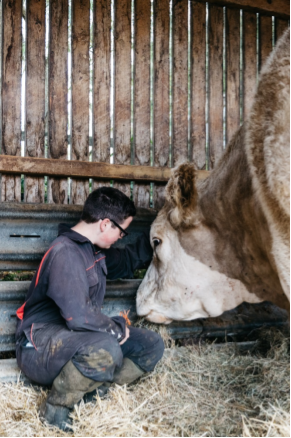
Based at Rylands Farm in Dorset, Future Roots is the brainchild of registered social worker Julie Plumley who grew up on a farm and 13 years ago saw the potential of the farming environment for helping young people who were not coping in a main stream school environment. Future Roots has seen over 1,000 youngsters, aged from as young as 8 to 18, through its gates since it began in 2008. Julie says, ‘the young people here are not the issue – it is society’s inability to cope with their particular needs.’
The organisation aims to provide stability and direction through any tough times for young people and their families. Julie explains, ‘Young people don’t come to Future Roots because they are ‘naughty’ or ‘bad’. They are referred because they need a safe and secure learning environment, where they feel they can achieve, in order to reach their potential. We believe there are always reasons for behaviours (not excuses) and that there is always a solution.’ Three quarters of the young people who come to the farm are boys in their early teens and have been referred by their school or local authority.
Julie believes that farming is a gateway which offers an alternative learning opportunity and prepares young people for future life. Some of the youngsters who have attended Future Roots have themselves become farmers. Nineteen year old Jordan is a prime example. He attended Future Roots from the age of 13, initially coming to the farm just one day a week after he had been excluded from school. The Future Roots team worked with Jordan and gradually saw his negative attitude change as he moved away from the allure of gangs and the influence of County Lines towards a life that gave him the skills to cope with his personal situation and opened up a new and exciting future working as an apprentice at a nearby farm. Julie comments, ‘It was wonderful seeing Jordan getting a full time job following a Future Roots plan of improving confidence and self-belief, together with functional skills qualifications and completing an apprenticeship.’
Part of the reason Future Roots has been so successful, is the freedom the farm gives to young people, explains Julie. ‘There is an open space; they are not confined in a class room and always have that feeling of being valued because they are always doing something useful, whether that is helping to clean out the cows or bottle feeding lambs or fixing a fence. ‘
The farming environment offers even the most anxious or uncommunicative child the opportunity to have affinity with another living thing. Everything is focused on learning by experience. By learning how to care for animals, the children and young people learn how to form relationships and, during this time of COVID, have benefitted in particular from being able to touch and hug the animals. Animal therapy helps them to build a relationship of trust which has a knock on effect with their human relationships too. Julie says, ‘Young people respond to being needed, wanted and valued.’